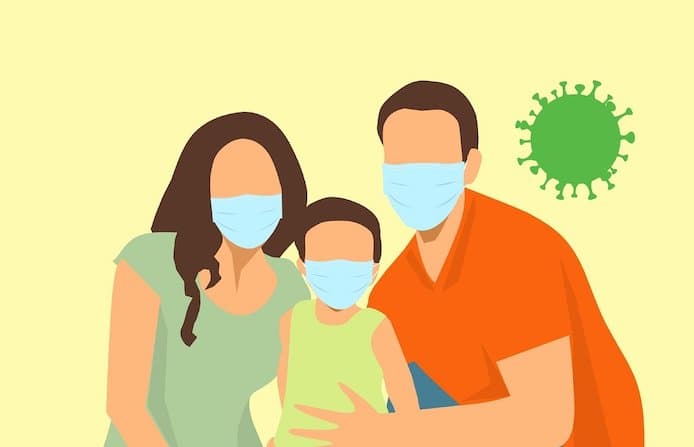Image by Mohammad Hassan via Pixabay.

Katie Burn
Katie Burn is a TeenMatters BACP senior trainee child & teen psychotherapeutic counsellor and yoga teacher.
TeenMatters: Talking to Young People About Coronavirus
As Coronavirus continues to spread across the globe, life as we know it is changing. With schools closing, exams being cancelled, social gatherings prohibited and news reports focusing on death tolls, how should we talk to our young people about what is happening? Read our 4 steps to having better conversations about the Coronavirus.
Step 1: Notice Your Own Feelings
Young people are very perceptive of how adults are feeling- no matter how hard we try to hide difficult emotions from them. In the same way that fear is contagious, so is calm. So take some time for yourself every day to check in with your own thoughts.
Journalling can be a great way to do this – grab a piece of paper, set the timer for 5-15 minutes (however much uninterrupted time you can get!) and write the title ‘I am feeling…’. Until the time is up, write down everything and anything that comes to mind, there is no right or wrong. Giving yourself space to air your anxieties should help to reduce the power of these thoughts over you and will also increase your awareness of how these anxieties might be trickling down to your children.
Explore what increases or decreases your anxiety and put measures in place to protect your peace e.g. limiting time spent reading the news. This difficult time is an opportunity to model to your young people how to tolerate uncertainty, and manage stress. Fitting in self care whilst managing family life can feel indulgent, but it’s important to remind yourself that you cannot pour from an empty cup.

Photo by David Schwarzenberg from Pixabay
Step 2: Have age appropriate conversations
Sometimes it can feel that withholding information from your children protects them. However, your child is likely to hear misinformation and sensationalised news headlines as well as chinese whispers from friends. If a young person doesn’t know what and why something is happening they will make up their own reasoning and it’s often worse than the truth! That being said, it’s important to give age appropriate information. Understanding developmental stages and being ready with responses to questions that are honest and developmentally appropriate will help ease anxiety.
5-10 year olds
Children in this age category tend to have very concrete thinking. Their ability to understand abstract thoughts, metaphor, sarcasm and irony is limited. Therefore they may overhear something about Coronavirus such as ‘it feels like the end of the world’ and take that very literally. It is important to be curious about any concerns they have and be ready to reassure them.
Child: ‘I’m worried that you and Daddy are going to die’
Adult: ‘I wonder what is making you think that?’
Child: ‘I heard them talking about people dying on the news’
Adult: ‘Wow that must have been so scary to hear. Remember the news isn’t talking about all of the people who get better, most people who get the virus get better very quickly. This is what we are doing as a family to keep everyone safe…’
Remember that all behaviour is your child trying to communicate something to you. When your child is acting out with disruptive behaviour, or inwards by withdrawing, you can help your child to identify and name the feelings they might be having with the use of an emotions wheel like the one below. This will help develop their emotional vocabulary and leave them feeling heard and understood.
Child: *child hits their sibling*
Adult: We don’t hit each other in this house, that behaviour is not OK. I wonder if you might have hit them because you are feeling really frustrated about not being allowed outside right now? Shall we look at the emotions wheel and you can show me what else you might be feeling at the moment?
Child: *is being quieter than normal*
Adult: I’ve noticed that you are a bit quiet today, is there anything that is worrying you?
Child: I’m sad that we can’t see Grandma for ages
Adult: it’s really hard being apart from the people we love isn’t it? Shall we arrange to Facetime her later today?
All of us get comfort from knowing we are not alone. Help normalise their feelings by letting them know that lots of young people are feeling worried right now. It’s ok to let them know that you feel a bit worried too, being mindful not to let your feelings overwhelm theirs.
This feelings wheel can be useful to print off and use together to help identify feelings and expand their emotional vocabulary:
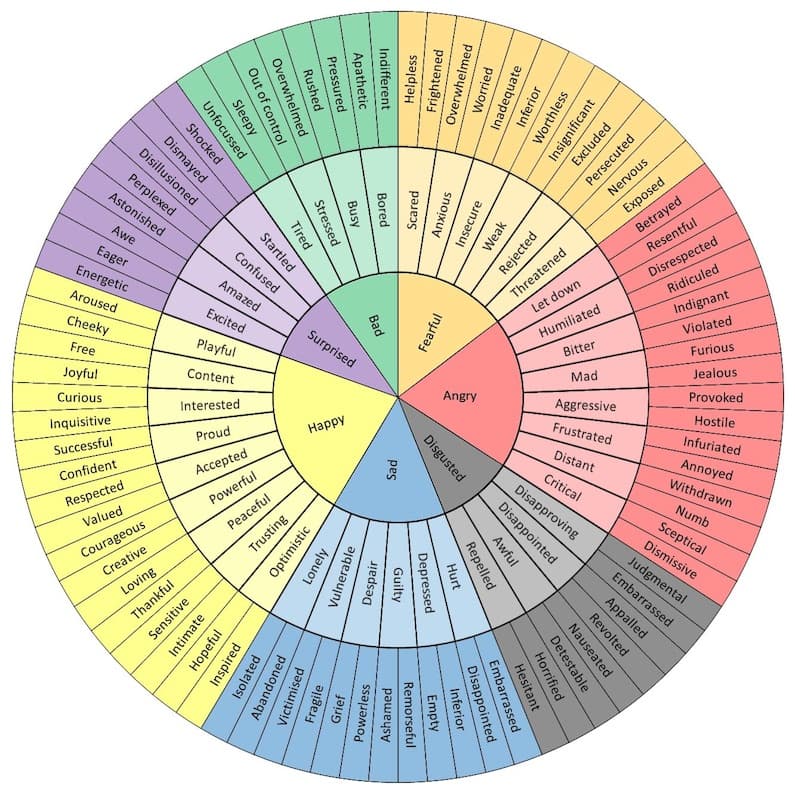
Image by Geoffrey Roberts
This comic explaining Coronavirus for kids by Malaka Gharib is an excellent resource for younger children. View the whole comic here.

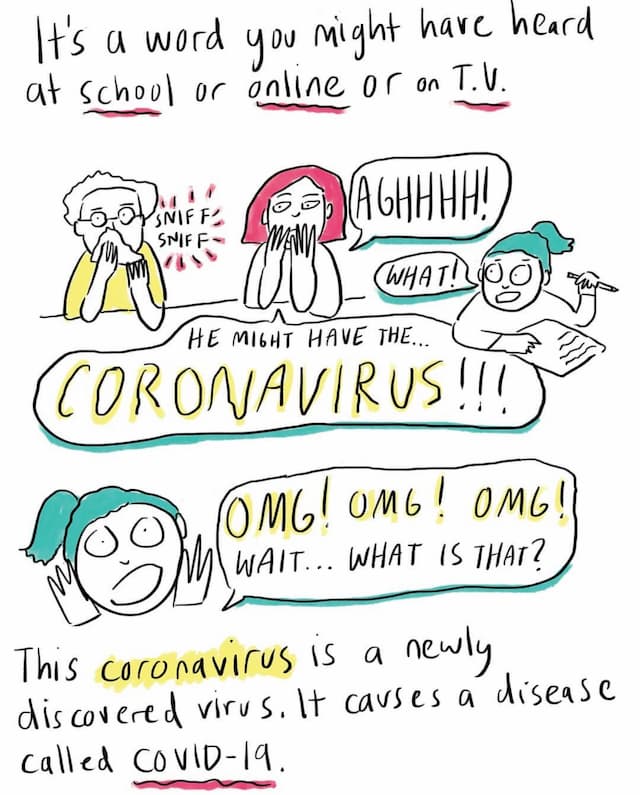
Teenagers
Adolescence is a stressful and unsettled time even in the absence of a global pandemic. It is a time of self discovery and exploration and therefore a time where the adolescent brain is programmed to be self-centred and risk taking. Don’t be surprised if they are more focused on concerns around friendships and identity than they are about the Coronavirus. They may find it particularly hard to follow guidance to stay safe due to their brains being less risk averse. That being said, adolescents also have the capacity for great empathy and social responsibility as evidenced by the school strikes in response to climate change. They can draw on this capacity to feel deeply in order to channel their energy into helping others and finding alternative ways to connect with one another.

Image by Mike Renpening from Pixabay
Teenagers have as much access to information as adults. With less structured time at school the likelihood is they may be spending more time on their phones feeling overwhelmed with information from social media & the news. Check in with them daily about how they are feeling and if they have any questions about information they have consumed that day.
Friendship groups are key for teenagers as they start to find their support network outside of their family. Whilst too much time on technology can be detrimental, it is important to support your teenagers in finding ways to use it to enrich their lives. Constantly asking them to be off their technology may make them feel isolated, trapped and frustrated. Ask them how they find their phones/laptops helpful e.g. staying connected with friends using apps such as ‘House Party’ and ask them if they need help managing their technology usage e.g. turning off news notifications, support in having screen free time. Try and make this a conversation rather than more sanctions which they have no control over.
Step 3: Validate their emotions
When your young person comes to you with a worry it can be easy to quickly jump to telling a child ‘not to worry’ or ‘don’t be silly that won’t happen’ as a method of reassuring them. However, these phrases are likely to have the opposite effect. Normalising the feelings they are having will help reduce the power these feelings have over them. Phrases like ‘I understand why you feel that way’ and ‘that must be really difficult to have those worries’ are simple but powerful ways to help them to feel understood and less alone. It may be tempting to try and ‘fix’ the issue but often just being heard is enough.
For teenagers, being isolated with your family during a time where developmentally you are programmed to start to explore distance and independence is going to be particularly tough. Where possible give them their own space that they can retreat to and let them know that you understand that social distancing from their friends is particularly hard for them. Many teenagers have missed out on important ‘endings’ such as last days at school, finishing exams, prom etc. they will need time and support to grieve the loss of these rituals.
Freely discussing emotions might not come naturally to your young people, if you are not sure how they are feeling, as well as the feelings wheel, you could try some of the open questions below.
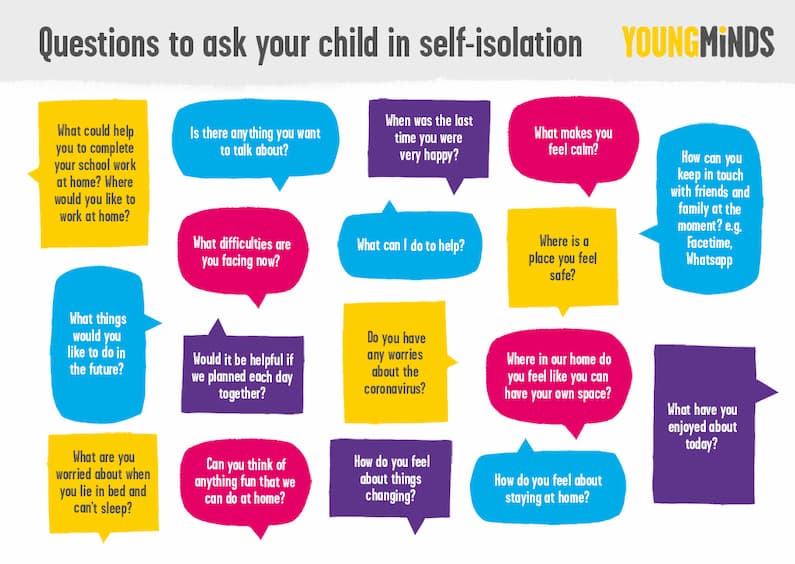
Image from https://youngminds.org.uk/ .
Step 4: Have Conversations about things they can’t control
Feelings of disappointment are often linked to feeling out of control. Shielding our young people from disappointment isn’t always possible. Instead of trying to prevent our children from becoming upset, it can be helpful to see these as learning opportunities to help our young people practice resilience, manage stress and survive uncomfortable feelings. Try to resist the urge to ‘fix’ and instead give them the experience of sitting with them, listening and bearing the disappointment together.
Washing hands thoroughly, not leaving the house, following government recommendations are all things we can do to control the spread of the virus. Instead of presenting it as a restriction try to reframe these actions as things your young person can do to help keep themselves and others safe. A helpful activity to do together might be to co-create an image like the one below making it personal to your young person.
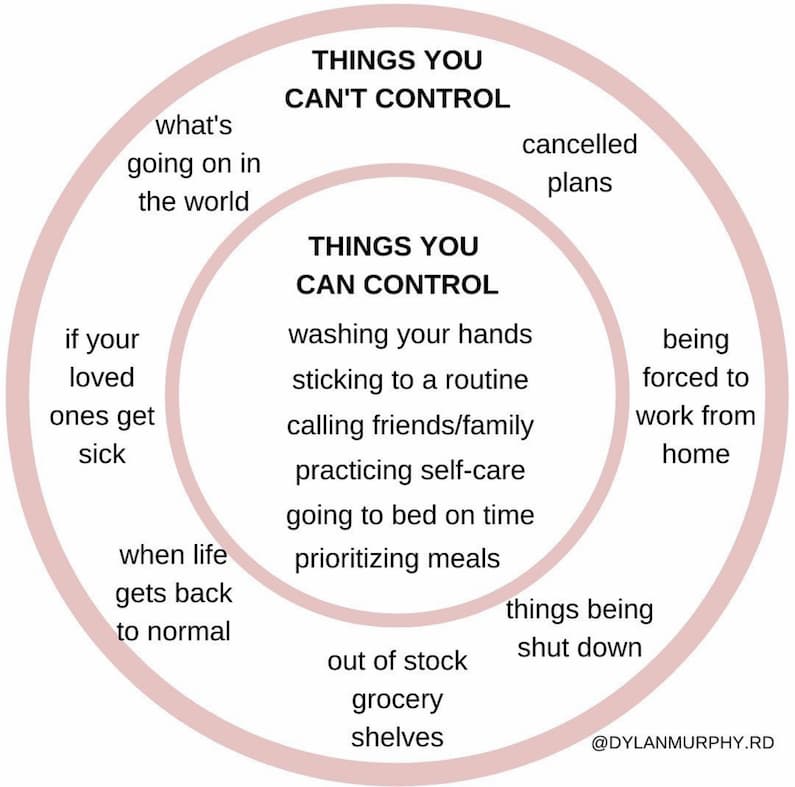
Image via Dylan Murphy RD
If you are worried about a young person and think they would benefit from specialist support, get in touch with us via hello@teenmatters.co.uk we are offering online sessions during this time of social-distancing.
TeenMatters is a counselling and coaching practice for children, teens, parents and adults. Based in South West London, we offer counselling in Twickenham, Richmond and Kew.

